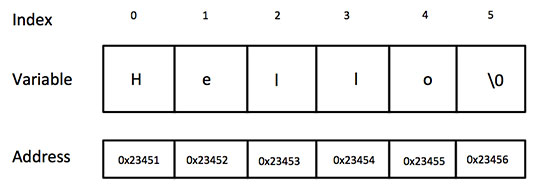Strings :
Strings are actually one-dimensional array of characters terminated by a null character '\0'. Thus a null-terminated string contains the characters that comprise the string followed by a null.
The following declaration and initialization create a string consisting of the word "Hello". To hold the null character at the end of the array, the size of the character array containing the string is one more than the number of characters in the word "Hello."
char greeting[6] = {'H', 'e', 'l', 'l', 'o', '\0'};
If you follow the rule of array initialization then you can write the above statement as follows −
char greeting[] = "Hello";
Following is the memory presentation of the above defined string in C/C++ −

Actually, you do not place the null character at the end of a string constant. The C compiler automatically places the '\0' at the end of the string when it initializes the array. Let us try to print the above mentioned string −
#include <stdio.h> int main () { char greeting[6] = {'H', 'e', 'l', 'l', 'o', '\0'}; printf("Greeting message: %s\n", greeting ); return 0; }
When the above code is compiled and executed, it produces the following result −
Greeting message: Hello
C supports a wide range of functions that manipulate null-terminated strings.
In this article, you'll learn to manipulate strings in C using library functions such as gets(), puts, strlen() and more. You'll learn to get string from the user and perform operations on the string.
You need to often manipulate strings according to the need of a problem. Most, if not all, of the time string manipulation can be done manually but, this makes programming complex and large.
To solve this, C supports a large number of string handling functions in the standard library "string.h".
Few commonly used string handling functions are discussed below:
| Function | Work of Function |
|---|---|
| strlen() | computes string's length |
| strcpy() | copies a string to another |
| strcat() | concatenates(joins) two strings |
| strcmp() | compares two strings |
| strlwr() | converts string to lowercase |
| strupr() | converts string to uppercase |
Strings handling functions are defined under "string.h" header file.
#include <string.h>
Note: You have to include the code below to run string handling functions.
gets() and puts()
Functions gets() and puts() are two string functions to take string input from the user and display it respectively as mentioned in the previous chapter.
#include<stdio.h>
int main()
{
char name[30];
printf("Enter name: ");
gets(name); //Function to read string from user.
printf("Name: ");
puts(name); //Function to display string.
return 0;
}Note: Though, gets() and puts() function handle strings, both these functions are defined in "stdio.h" header file.